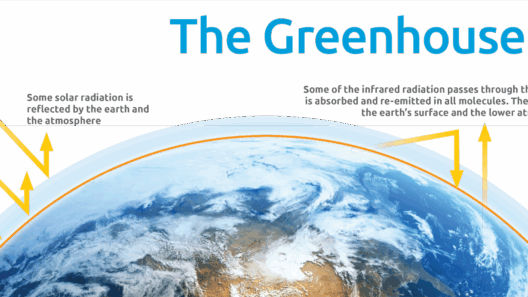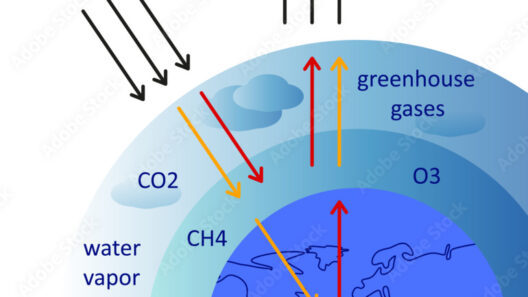Understanding the intricate dynamics of Earth’s climate is vital for anyone concerned about our planet’s health. One pivotal concept in this discourse is the greenhouse effect. This phenomenon is responsible for regulating Earth’s temperature and making it habitable for countless species, including humans. However, the looming threat of climate change has brought this effect into the spotlight, prompting critical questions about its workings and implications.
The greenhouse effect is a natural process where certain gases in Earth’s atmosphere trap heat, thereby maintaining a climate conducive to life. Without it, the average surface temperature of our planet would be approximately -18 degrees Celsius (0 degrees Fahrenheit) instead of the comfortable 15 degrees Celsius (59 degrees Fahrenheit) that we experience today. The gases responsible for this effect include carbon dioxide (CO₂), methane (CH₄), nitrous oxide (N₂O), and water vapor, collectively known as greenhouse gases.
To grasp this concept fully, we must delineate the specific mechanisms at play within the greenhouse effect.
How Do Greenhouse Gases Function?
To comprehend the greenhouse effect, one must first understand the role of greenhouse gases. These gases are prominent in the lower layer of the atmosphere, also known as the troposphere. Solar energy from the sun reaches Earth in the form of visible light, which warms the planet’s surface. When this energy is re-radiated back into the atmosphere, it transforms into infrared radiation, a form of heat.
Greenhouse gases absorb a substantial portion of this infrared radiation, preventing it from escaping back into space. Instead, they re-radiate this heat in all directions, including back toward the Earth’s surface. This process is akin to a blanket enveloping the planet, providing warmth and enabling life to thrive.
It is this delicate balance that sustains optimal temperatures for ecosystems. However, human activities have begun to tip this balance, primarily through the burning of fossil fuels, deforestation, and industrial processes. An increase in greenhouse gas concentrations leads to enhanced heat retention, resulting in global warming and subsequent climate implications.
Current Climate Crisis and Human Impact
As we delve deeper into the relationship between greenhouse gases and climate change, it becomes evident that human actions are profoundly affecting this natural system. The industrial revolution marked a significant turning point in this relationship. The combustion of fossil fuels and the extensive use of land for agriculture and urban development have dramatically increased the levels of CO₂ and methane in our atmosphere. As of recent observations, atmospheric CO₂ concentrations have risen from approximately 280 parts per million (ppm) before the industrial revolution to over 400 ppm today.
This increase in greenhouse gas concentrations poses significant threats, including rising global temperatures, changing precipitation patterns, sea-level rise, and extreme weather events. These phenomena jeopardize ecosystems and human societies alike, impacting agriculture, biodiversity, and water resources. The evidence is irrefutable—climate change is a pressing concern that calls for immediate and substantial action.
What Are the Signs of the Enhanced Greenhouse Effect?
Several observable phenomena serve as indicators of the enhanced greenhouse effect, including:
1. Rising Global Temperatures: The average global temperature has risen by approximately 1 degree Celsius since the late 19th century, with consequences for weather patterns and seasonality.
2. Melting Polar Ice: The polar ice caps are shrinking at alarming rates, with estimates suggesting the Arctic could be ice-free during summer months by the middle of the century.
3. Ocean Warming and Acidification: Oceans have absorbed around 30% of CO₂ emissions, leading to both warming and acidification, which endangers marine life.
4. Increased Frequency of Extreme Weather Events: The intensity and frequency of hurricanes, droughts, and floods are on the rise, largely attributed to the changing climate.
The Human Response: Mitigation and Adaptation Strategies
Recognizing the profound impacts of the enhanced greenhouse effect, global efforts towards mitigation and adaptation have gained momentum. Mitigation refers to strategies aimed at reducing greenhouse gas emissions, including:
– Transitioning to renewable energy sources such as wind, solar, and hydropower.
– Promoting sustainable agriculture practices that reduce methane and nitrous oxide emissions.
– Implementing energy efficiency standards to decrease overall consumption.
Adaptation strategies, conversely, focus on adjusting societal responses to the effects of climate change. This might involve building flood defenses, modifying water resource management, or enhancing community resilience to extreme weather events.
A Call for Global Unity
The greenhouse effect exemplifies the complexity of Earth’s climatic system. While it is a natural and critical process, human-induced changes threaten to destabilize this balance and exacerbate climate change. Addressing this issue necessitates a collective effort—a unity of governments, businesses, and individuals worldwide to implement sustainable practices and policies.
By prioritizing education, fostering awareness, and advocating for systemic changes, we can work together to mitigate the adverse effects of the enhanced greenhouse effect. Every action counts, be it reducing personal carbon footprints or supporting larger policies aimed at environmental sustainability.
In conclusion, the greenhouse effect is indispensable in maintaining the Earth’s temperature and ecosystems. Understanding its mechanics empowers individuals and societies to recognize the magnitude of climate change and the urgent action required to combat this global crisis. The time for action is now—our planet’s future hinges on our choices today.







